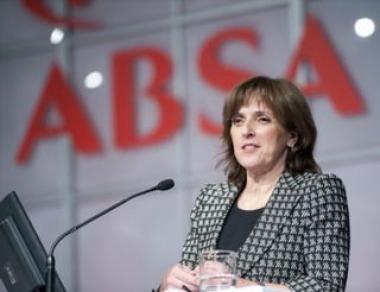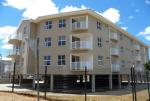Absa sues Nedbank over Pinnacle Point losses
 Maria Ramos CEO of ABSA
Maria Ramos CEO of ABSA
Absa turns to court to recover R773m from Nedbank for losses relating to an exposure to Pinnacle Point, but the latter says it will defend the action.
ABSA is going to court in an attempt to recover more than R773m from Nedbank for losses it claims it suffered after taking over an exposure to Pinnacle Point through single-stock futures trading that went sour.
This is the first time one of South Africa’s big four banks has made such a big claim against another.
Absa has issued a summons against Nedbank in the South Gauteng High Court that contains unusually harsh language, accusing Nedbank and subsidiary Syfrets of failing to exercise the "due care" and "skills reasonably expected" of a reputable bank.
Barclays-owned Absa on Wednesday confirmed the action. "We cannot comment further in relation to this matter, which is now the subject of legal proceedings," said Marthinus van Rensburg, head of its legal department.
Nedbank confirmed receiving the summons. "On August 17 2010 the Securities Regulation Panel ruled that Nedbank’s single-stock future activity in Acc-Ross was not for the purposes of acquiring control," Brian Kennedy, managing executive of Nedbank Capital, said on Wednesday. Acc-Ross subsequently merged with Pinnacle.
"We remain of the view the group cannot be held responsible for any alleged loss suffered that is based on a sharp decline in the Pinnacle Point Group share price — either directly or indirectly. We will take all the necessary steps to defend the actions instituted."
Pinnacle Point advised shareholders last week to continue to exercise caution until a full announcement on its final liquidation and potential delisting.
Single-stock futures give an investor the right to buy shares at a fixed price on a future date.
Absa’s summons accused Nedbank of violating the rules of the Takeover Regulation Panel, the Competition Act and the Banks Act. It claimed Nedbank did not get permission from the banking regulator to acquire Pinnacle and neither did it seek approval from the Competition Tribunal.
Nedbank subsidiary Syfrets Securities bought shares in Acc-Ross in 2007, when it acted as a counterparty to futures trade with clients of derivatives broker Cortex Securities.
According to a report by research firm Intellidex, in December 2008 clients of Cortex defaulted on margin calls related to various exposures to single-stock futures, forcing the broker, in turn, to default to the JSE.
Absa was the clearing bank for Cortex. In terms of JSE rules, this meant Absa had to make good any obligation the broker had to the JSE, and it took delivery of the underlying stocks on expiry of the futures in December 2008.
These included stakes in Sekunjalo , Blue Financial Services , ConvergeNet and Pinnacle Point. The largest exposure was to Pinnacle Point, and Absa inherited a 27% stake in the business.
Nedbank had been the counterparty to the single-stock futures Cortex had traded, in a scheme in which both companies offered clients a mechanism to raise cash against shares they held.
"In effect, the client would sell the underlying shares and then buy the single-stock futures (maintaining) the same effective equity exposure," Intellidex said.
"However, the future required a margin of only around 10% of the market value of the exposure. So the client effectively raised cash of 90% of the value of the equity."
At the time, trades could be booked on the market without being matched through the central order book, so the futures could be written directly on the actual shares held by the client.
As the counterparty, Nedbank hedged its exposure by holding the underlying asset. Clients would in effect sell their shares to Nedbank and the bank would sell the client a future. The deal would then be brokered with Cortex, with Absa acting as the clearing bank.
Nedbank knew Cortex would be unable to fulfil its contractual obligations and was "negligent or reckless", says Absa’s summons.
"The scheme was made available to major shareholders in Pinnacle Point. One shareholder in particular, a founder of the business but no longer a director, used the scheme aggressively," Intellidex said.
"He originally switched his underlying holding in Pinnacle into futures. He then used the cash raised to acquire more futures over Pinnacle. This clearly had the effect of supporting demand for Pinnacle shares. Each time a future was written, Nedbank would acquire Pinnacle shares to maintain its hedge.
"The process continued until November 2008 when 89,3% of the equity of Pinnacle was held in the futures open position. This meant, on one reading, that the hedge that Nedbank had established meant the bank owned this proportion of the shares of Pinnacle."
Pinnacle then entered into a transaction and share swap agreement, which saw existing shareholders diluted. The 89,3% exposure was reduced to 27%, which Absa inherited — the basis of its claim.
"It is clear that … Absa was ignorant of its exposure or liabilities in terms of its clearing relationship with Cortex," Intellidex said.
Absa’s claim was therefore premised on the view that Nedbank was the beneficial holder of the 89,3% Pinnacle stake acquired in stages.

















